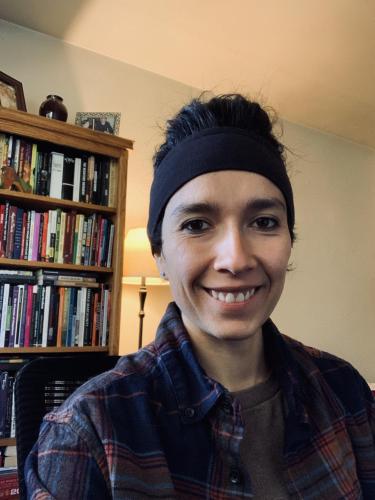This article is part of a series highlighting the graduate students selected for the 2020 Provost’s Fellowship for the University Libraries.
Lau Malaver, a PhD student in the Department of Ethnic Studies, is a 2020 Provost Fellow for the University Libraries. Their project explores how marginalized communities cope with various systems of oppression by curating different kinds of cultural projects within library spaces.

The theory Malaver cultivated through this fellowship project revolves around the Spanish word recovecos, which in English means “nook”. Malaver interprets recovecos both literally and metaphorically to explore how we understand and react to the hidden parts of our society.
For this fellowship, Malaver spent time considering how library instruction, outreach and programming can make space for theoretical frameworks such as critical race theory, embodiment and artivist—activism and art—practices.
“I’m uncovering what it means for libraries to engage with information and knowledge in a physical space, while looking at how services are moving online and how to keep physical spaces accessible to different communities who need these spaces,” Malaver said.
Malaver says the inspiration for examining the library’s role in providing inclusive spaces came from the CU Living Library: Dialoging Difference program, which offers the university community a chance to engage in intimate conversations around stories of diverse personal backgrounds. The program provides human “books” a supportive space to tell a story from lived experience. “Readers” respond by asking questions, which often lead to in-depth conversations around gender, race, nationality, religion, ability and mental health. Malaver participated in the program as a 2019 “book” and said the experience left a lasting impression.
“Having people hear my story and respond led to a wonderful dialogue around a part of my history that was personal,” said Malaver.
This spring’s Living Library program was one of the events canceled by precautions taken to protect our community from COVID-19. Malaver and Lindsay Roberts, education librarian and Malaver’s fellowship mentor, have found space to further focus on the theoretical pedagogies informing the Libraries’ programming and outreach practices in the future.
“Working with Lau this semester has been a huge pleasure and peer learning journey,” Roberts said. “I have enjoyed learning from Lau’s work in embodied praxis and decolonial pedagogies. Our shared passion is for libraries to serve as spaces for storytelling, inviting counter-stories and community-building.”
Malaver and Roberts are continuing to explore scenarios where the Living Library program can provide a virtual space for the community to share stories and engage in conversation during this trying time.
“People will want to share their stories from this time,” Malaver said. “Allowing people to enter into those hidden spaces and ask their peers, ‘Hey, what’s going on in your life? What has been difficult? What has been great? What has been a transition period for you?’ is vital for building community. Being able to pursue recovecos says to me that my intention for this fellowship is to understand the spaces where people, technology and information intersect.”
Malaver and Roberts hope to hold conversations around this research in the coming months, through virtual conference presentations.
The Provost’s Fellows for the University Libraries is generously funded by the Provost, the Graduate Teacher Program, the Friends of the Libraries and the Dean of the Graduate School.
